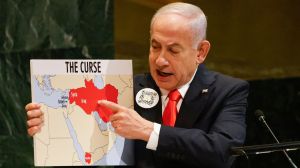The Kashmir Committee puzzle
Why did Deputy Prime Minister L.K. Advani encourage the Kashmir Committee (KC), under the chairmanship of Ram Jethmalani, to talk to the lea...

Why did Deputy Prime Minister L.K. Advani encourage the Kashmir Committee (KC), under the chairmanship of Ram Jethmalani, to talk to the leaders of non-National Conference parties in Srinagar and then invite these leaders to New Delhi for further talks with the prime minister and deputy prime minister? And, why, on its return from Srinagar, did he refuse to have anything to do with it?
In what manner did the DPM’s alleged ‘encouragement’ to KC manifest itself? Did he leap with joy, slap his sides and exclaim at the highest level of excitement: ‘What a wonderful idea: go quickly to Srinagar and bring back to North Block all those separatist Kashmiris so that we can launch them in this electoral battle?’
Or did Advani in deference to Ram Jethmalani’s seniority, give the KC a patient hearing and politely nodded agreement when one of its members asked,‘Shall we inform the media that we have your sanction to meet the separatist leaders and that, should these talks promise light at the end of the tunnel, the PM and you will meet these leaders?’
The genesis of the KC can be traced back to June 7, when Jethmalani was in Srinagar to condole the death of his friend, Abdul Ghani Lone. A conversation at the Palace Hotel, overlooking Dal Lake, with Shabir Shah and about 50 ‘jehadis’ caused Jethmalani and his interlocutors to appreciate the need for a continuation of such talks.
But before the KC could become buoyant, another Kashmir-related script was playing itself out on another plane: Farooq Abdullah would step down from the Valley, become vice president, the subsequent Governor’s rule in Kashmir would then impart to the elections an extra sheen of fairness.
Jethmalani insists that Vajpayee had told him Farooq Abdullah was refusing to come down as vice president, but this is at variance with all other versions. Once Abdul Kalam became president, it was obvious that no other Muslim would be slotted as vice president.
Farooq then accepted a place in the union cabinet as minister without portfolio but only after Omar Abdullah was installed as chief minister in Kashmir.
By the time the KC was constituted, Farooq Abdullah had refused to budge from Srinagar until he had at least launched the election process. Also the chief election commissioner had announced the dates for the Kashmir polls.
What room for manouevre was the KC left with? Where was the time for any persuasion to be effective at least in the context of elections which, to be broad based, required the recalcitrant elements to first be converted and then be given time to explore the electoral turf?
But if the KC was not going to be able to play any role in the context of the elections, why was it ‘encouraged’ to be air-borne?
New Delhi is full of conspiracy theories. One of them suggests that Jethmalani was ‘encouraged’ to proceed on his mission in order to neutralise some quiet initiatives on Kashmir the PMO was embarked on.
After all, A.S. Daulat, senior officer and former head of RAW, is the officer on special duty for Kashmir in the PMO.
But what initiative could the PMO have embarked upon? It is true that leaders of the Hurriyat and other parties are in regular contact with Dulat. It is also true that the sons of the assassinated leader, Bilal and Sajjad Lone, noticing a popular upsurge in response to their father’s ‘martyrdom’, looked the other way even as candidates from their father’s Popular Front filed their nominations in defiance of Hurriyat hardliners.
So, when the KC returned from Srinagar, with Shabir Shah as their probable catch, the question arose as to whether or not the PM and DPM should meet Shah. Should Vajpayee meet Kashmiri leaders who, at this late stage, were only interested in discussing ‘conditions’ under which elections would be valid?
What kind of a signal would this send to elements in the Valley who had jumped into the electoral fray without any preconditions simply in response to what they gauge is the popular mood?
Vajpayee conveyed his hesitation to Advani who, thereafter, refused to meet Shabir Shah. ‘Volte-face! Volte-face,’ screamed the KC. Jethmalani is firmly of the view that Farooq Abdullah scuttled the crucial rendezvous by striking a deal with the BJP that he would help a handful of BJP candidates win in Jammu and elsewhere.
The KC and others, who keep its ears close to the ground, may scream ‘volte-face’, but the fact of the matter is that the parivar hardliners cannot find on Advani’s robes any taint of ‘softness’ in his handling of the Kashmir script in recent weeks.
In these circumstances, should even a semi-credible election materialise in Kashmir, it will not be because New Delhi tried hard. In fact, at that moment the KC will have the links for another beginning in the Valley.
By all accounts, it has considerable good will because it was generally felt in the Valley that the KC had its heart in the right place.







- 01
- 02
- 03
- 04
- 05
























